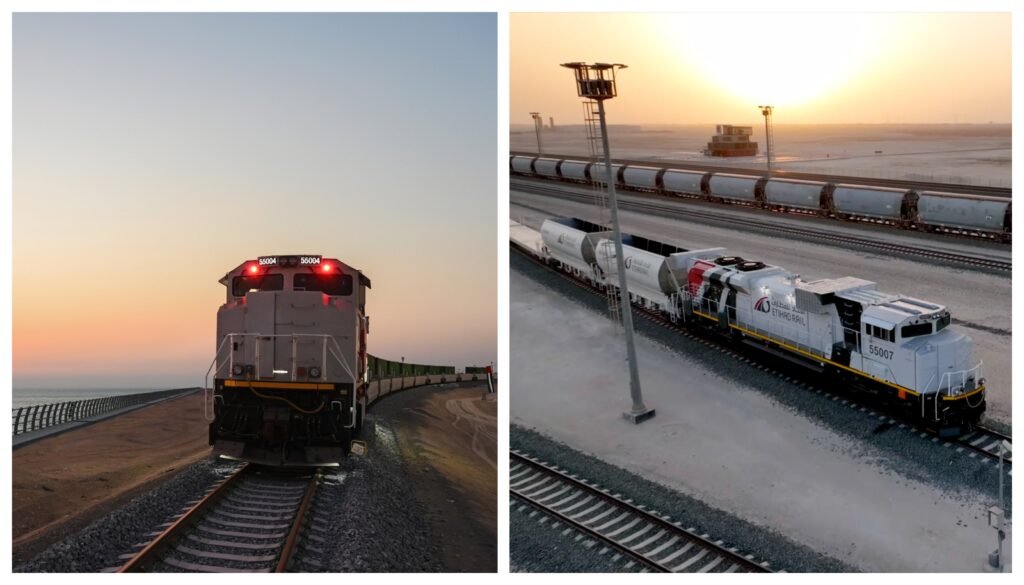Earlier, Etihad Railways announced that it is 100% operational. A video showing the train fully operational across the UAE was released on 3 April 2023. The project aims to provide more reliable, sustainable, and cheaper solutions, opening new trade grounds.
Etihad Rail took to Twitter to share the video. The post was captioned:
“Etihad Rail’s freight services are now fully operational, offering comprehensive end-to-end transport solutions that cater to all your business needs. With our cutting-edge fleet, we can efficiently transport any type of cargo across the UAE.“
And now, Etihad Rail has released a series of pictures showing the train tracks running through the Fujairah mountains and connecting to the Fujairah Port and the rest of the rail network. In a Twitter post, Etihad Rail said: “Our #PhotoOfTheWeek showcases the natural beauty of Fujairah, where our train tracks extend through the mountains, to Fujairah Port and the rest of the rail network.”
Also Read: Etihad Rail: Everything We Know So Far
Etihad rail is currently operational for freight only
The service is currently operational for freight only and it remains unknown when it will open for passengers. The ambitious project contributes to strengthening the country’s preparations for the future. His Highness Sheikh Mohammed bin Rashid Al Maktoum, Vice President, Prime Minister of the UAE and Ruler of Dubai, affirmed that the national railway network is an important milestone in the UAE’s development journey.
The project is one of the largest infrastructure projects in the region and aims to link the seven emirates with a main railway network. Etihad Rail made the gran announcement in a new video on Twitter. The post is captioned: “Inspired by the spirit of unity and the guidance of our leadership, we have taken important steps towards connecting the Emirates through the UAE’s National Railway Network from Al Ghwaifat all the way to Fujairah,” and shows tunnels and tracks being laid down.
Also Read: Soon You Can Travel From UAE To Oman In 47 Minutes
The UAE national railway network passes through a variety of geographical terrains, within a large-scale engineering plan that includes the construction of 593 bridges and crossings of all types, and 9 tunnels with a length of 6.5 km. It took 120 million cubic meters of excavation work to complete, to ensure the highest levels of vehicular traffic flow under the tracks of the railway network. However, it will be long before the train takes in passengers. As of now, the train will only permit freight.
The freight trains will connect 4 major ports. It will include 7 logistics centres across the country, to serve trains and related businesses.
The network also includes a number of charging stations located in Ruwais, Industrial City of Abu Dhabi (ICAD), Khalifa Port, Dubai Industrial City, Jebel Ali Port, Al Ghail and Fujairah Port. These locations are a major hub for local and regional distribution and logistics services, as it includes customs warehouses and on-site cargo inspection services.
The UAE National Railway Network will provide solutions for investors and customers, due to its ability to transport all types of goods, including petrochemicals, raw steel, limestone, cement, building materials, industrial and domestic waste, aluminium, food commodities, and general cargo.

The network contributes to supporting companies’ businesses and enhancing investment opportunities. The main line of the UAE National Rail Network extends from Ghuweifat on the border of the Kingdom of Saudi Arabia, to Fujairah, forming an essential part of the global supply network.
The UAE national railway network will contribute to supporting the national economy at a value of AED 200 billion, and saving AED 8 billion in the cost of road maintenance. The network’s tourism benefits are estimated at AED 23 billion. The project also supports the UAE’s sustainable development goals and contributes to achieving the UAE Net Zero by 2050, through reducing carbon emissions in the road transport sector by 21%, and reducing road transportation emissions per capita by 40%, by 2050.
Also Read: Saudi Arabia Gets A New Airline ‘Riyadh Air’












1 Comment